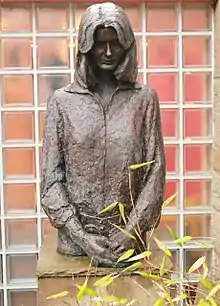Maggie Keswick Jencks
Margaret Keswick Jencks (10 October 1941 – 8 July 1995)[1] was a Scottish writer, artist and garden designer who co-founded Maggie's Centres with her husband Charles Jencks.[2]
Maggie Keswick Jencks | |
|---|---|
 Statue of Maggie Jencks at Maggie's Centre in Edinburgh | |
| Born | Maggie Keswick October 10, 1941 Cowhill Tower, Holywood, Dumfriesshire, Scotland |
| Died | July 8, 1995 (aged 53) |
| Nationality | Scottish |
| Occupation | Writer Artist Garden designer |
| Years active | 1978–1995 |
| Spouse(s) | Charles Jencks |
Early life
Margaret Keswick was born at Cowhill Tower near Holywood in the county of Dumfriesshire in Scotland[2] the only child of Sir John Keswick and Clare Elwes.[1] Maggie's father was taipan of Jardine Matheson, the influential Scottish–Chinese trading company. The family spent time in Hong Kong and Shanghai as well as the UK.[3] Keswick was educated in England and read English at Lady Margaret Hall, Oxford. After working in fashion, she studied at the Architectural Association in London and in 1978 she published The Chinese Garden: History, Art and Architecture.
Career and legacy
In 1978, she married as his second wife, Charles Jencks, writer and landscape artist, with whom she founded the first Maggie's Centres in Edinburgh, which opened in 1996.
A bust of Jencks is on display in the Hall of Heroes of the National Wallace Monument in Stirling.
Publications
- Keswick, Maggie; Jencks, Charles; Hardie, Alison (1978). The Chinese Garden: History, Art and Architecture. Cambridge, MA: Harvard University Press. ISBN 978-0-674-01086-4. OCLC 223412044.
References
- Dingwall, Christopher (2006). Ewan, Elizabeth; Innes, Sue; Reynolds, Siân (eds.). The Biographical Dictionary of Scottish Women From the Earliest Times to 2004. Edinburgh: Edinburgh University Press. p. 196. ISBN 978-0-748-62660-1. OCLC 938839302.
- Saxon, Wolfgang (15 July 1995). "Maggie Keswick, 53, Expert on Chinese Gardens". The New York Times.
- Kellaway, Kate (19 February 2011). "Maggie's centres: how one woman's vision is changing cancer treatment". The Guardian.